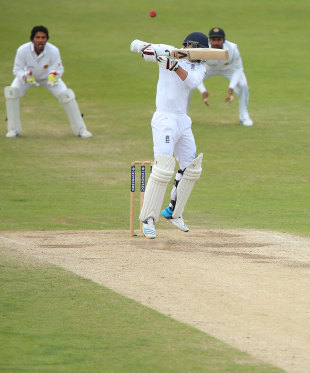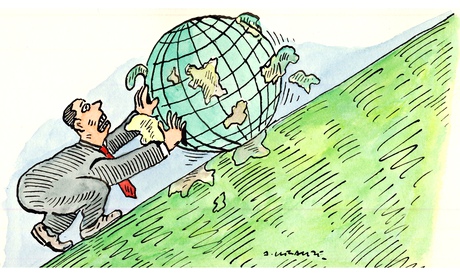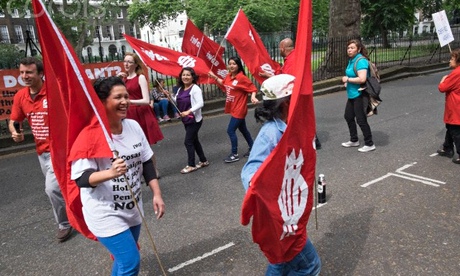Jarrod Kimber in Cricinfo
Sri Lanka's GDP ranking in 2013 was 112, the UK were 21. They have a very small population compared to the other subcontinent cricket nations. Transparency International ranks them as the 91st least-corrupt nation on earth. They have only one really big modern city. Their cricket is mismanaged by selfish inept politicians. The team is signed off by the government. They don't always pay their cricketers.
But this year they have beaten the world. And now they've beaten England with men who have lost their houses in tsunamis, been shot at by terrorists, competition winners and a tubby man who works at a bank.
Sri Lanka is a special place.
---
At the Sampath Bank headquarters in Colombo there is a round-faced man smiling happily wearing a polo shirt with the bank's logo on it. He is being felicitated. He is a finger-spinning maestro. He is a World T20 winner. And this man, Rangana Herath, is also an employee at the bank.
Not in a ceremonial way. Not just to beef up their cricket team. But Herath works at the bank. Doing things that people do in banks. He probably has his own coffee mug there. When Herath sees the Sri Lanka cricket schedule, one of his first calls is to his bank manager. To ask for leave to travel to the tour.
Herath worked there when he made his comeback to Test cricket in 2009. Herath worked there this while he took more Test wickets than any other bowler in 2012. Herath worked there even while he was ranked the second-best Test bowler on earth.
Twenty-four days before his felicitation, Herath took 1-23 in four overs. Sri Lanka won the World T20 that day.
---
Sri Lanka Cricket is currently in debt. An exact amount is unknown. It was at one stage supposed to be US$70m. That is to pay for new stadiums that replaced the old stadiums that were in some cases not that old. This led them to not pay their players.
According to Forbes, MS Dhoni was worth US$30m last year. He captained the side that Sri Lanka beat in the World T20 final. In sport, money does buy wins. Internationally, less so. But Sri Lanka are playing cricket off the field in a way that the other countries haven't done for decades. Their support staff is understaffed, undertrained, and at times seemingly not able to do their own research. They rely on the touring journalists for a lot that cricket board staff would usually do. They are comically unprofessional.
This is the first Test series that Sri Lanka had sent players over early to properly acclimatise before the tour. Herath and Shaminda Eranga both came over. It was a step towards professionalism in a sport that has been professional for years.
---
North of Colombo there is a town called Chilaw. There is an ancient Hindu temple in Chilaw that was once visited by Gandhi. Every year they have the Munneswaram festival. It was once famous for pearls. And they have a first-class cricket team the Chilaw Marians Cricket Club.
Shaminda Eranga comes from Chilaw.
Like many in Sri Lanka, the cricketers from Chilaw are largely invisible inside the system. There are Test-quality cricketers playing on the streets of the Hikkaduwa right now that will never play with a hard cricket ball in their life.
Eranga was not playing first-class cricket. He was not in the system. He shouldn't have made it at all. But like his seam-bowling partner Nuwan Pradeep, he made his way to a fast-bowling competition. He bowled fast. But five guys bowled faster. Somehow the sixth-fastest bowler in that completion was picked for Chilaw Marians Cricket Club. Five years later he would clean bowl Brad Haddin with his second ball in international cricket.
Eranga is the closest thing Chilaw has produced to a pearl in a very long time.
| Sri Lanka played gritty, tough, bits-and-pieces cricket that mostly was just keeping them in touch of England, nothing more. They just refused to be beaten. They just refused to go away | |||
---
Herath has been in Test cricket since 1999. He invented a carom ball. He disappeared back into first-class cricket and the bank, and was in club cricket in England when he was picked for his comeback.
There are no billboards in Sri Lanka with his face on them. He's not famous like Kumar, Mahela, Lasith or Angelo. Even Ajantha Mendis is sponsored by chicken sausages. Herath may be a Test bowler with over 200 wickets who has carried a poor attack for years, but he's just a really good player, not a star or legend.
Against Stuart Broad, Herath had bowled around the wicket with a low arm action. Broad takes a big step forward when he defends spinners. Herath bowled the ball exactly from the right angle, with the right amount of turn, to ensure that Broad would miss one.
Against James Anderson, he bowled over the wicket with a high arm action. Anderson gets right over the ball when it's full, and can dangle his bat when it's slightly shorter. Herath was trying to find either of these two dismissals.
Broad missed his, Anderson survived.
---
Eranga spent most of the first innings not getting anywhere. There was some swing, but not enough. He bowled a great line and length to Sam Robson, but couldn't get the edge. England just moved further and further away with the game. Even the second new ball did nothing for him. Sri Lanka were all but gone. But then they got the wicket of Ian Bell. It was Eranga's wicket. He added Moeen Ali's wicket to it. The next morning he had Chris Jordan and Anderson as well. They were still behind, but they were within some kind of touch.
In the second innings, Eranga bowled the worst he had in the series. At Lord's he was the pick of the bowling, in the first innings at Headingley he inspired the comeback. But when his team really needed him to help win the game in this innings, he couldn't get it right. He lost his line and length. He didn't make people play. He was too short. The only time he looked good was when he just tried to knock Joe Root's mouth off. That didn't work either. Then when he took a wicket, that of Jordan, he also overstepped.
Eranga's first 23.4 overs were just not great.
It was probably mostly luck that he received the last over. Dhammika Prasad had bowled the second last over. Herath could not outfox Anderson. Pradeep looked spent. And Angelo Mathews had lost his first innings magic.
Eranga was just the man who was left.
---
Sri Lanka feel like they don't get the credit they deserve. They feel that when they win, it is Yuvraj's (or whoever else that game) fault. Or the home conditions helped them. Or the other team was just useless. On Monday at Headingley, they started one of the great comebacks in modern Test cricket. Their captain played one of the great knocks of modern Test cricket. They were on the verge of their first ever series win in England. Their first major series win outside Asia for almost 20 years.
And the next day the cricket world talked about the other captain who had a shocker.
Before the tour they lost their coach to the opposition. While here they have been accused of breaking the spirit of cricket. Their spinner was accused of breaking the laws of cricket. Their bowlers were pop gun and a glorified county attack. Their batmen were suspect against the moving and short ball. They would be bombed by the short ball. They were sent in to be annihilated here. They felt under siege.
At Lord's it got even worse when Broad and Anderson attacked them with the ball, and the English players, lead by the extremely mouthy Root, came at them very hard. Pradeep was almost beheaded. After that they were upset by Cook's comments about Sachithra Senanayake's action. And England had dominated them for eight straight days of cricket.
They were sick and tired of being plucky cheerful losers. They wanted a win. They saw one. And they became very vocal. Root's ears will be ringing from his entire innings. Broad's unscheduled toilet break 20 minutes into his innings probably got more of the same.
---

| |||
This is not the strongest team Sri Lanka have brought to England. They've had Murali, Dilshan, Jayasuriya and Vaas to bring before. This team has two all-time greats, one potential great, and the second-best spinner they have ever had.
It also has Nuwan Pradeep and his bowling average of 72.78. It has Dimuth Karunaratne, who is immune to going out early, or making runs from his starts. Lahiru Thirimanne, who stopped believing runs existed. And Prasanna Jayawardene, who looked a spent force with bat and gloves.
Mahela Jayawardene never made a hundred. Herath never took a five-for. Nuwan Kulasekera was dropped after the first Test. But people kept stepping up. They had batted an entire fifth day to save an overseas Test only once before. But they all chipped in and did it with one of the worst batsmen in world cricket somehow surviving. Their bowling could never compete with England's, so their fielders took many more of their chances. Their middle order slipped up in the third innings at Headingley, so their tail made runs.
It was gritty, tough, bits-and-pieces cricket that mostly was just keeping them in touch of England, nothing more. They just refused to be beaten. They just refused to go away. They didn't smile, or play nice. They clawed and screamed.
On paper this Sri Lanka should never beat England. They should have been outgunned in almost every way. In preparation. Financial. Backroom. Coaching. Facilities. And even in the players who were involved. Virtually every single thing about England should have been better than Sri Lanka.
---
Anderson was playing for England by the time he was 21. He's the embodiment of a professional cricketer. You can see his face on the back of buses in London. He has won games with the ball all round the world. He's saved games with the bat. Today he faced 54 balls with the knowledge that any mistake and his team would lose a Test, a series, become a joke. Yet he played almost every ball well. Stoically. Until Sri Lanka very nearly gave up.
On the 55th ball, a world-class professional sportsman was bounced by the sixth-fastest bowler from the North Western Province and caught by a chubby slow guy from Kurunegala.
The pearl and the bank clerk. Sri Lanka is a special place.







